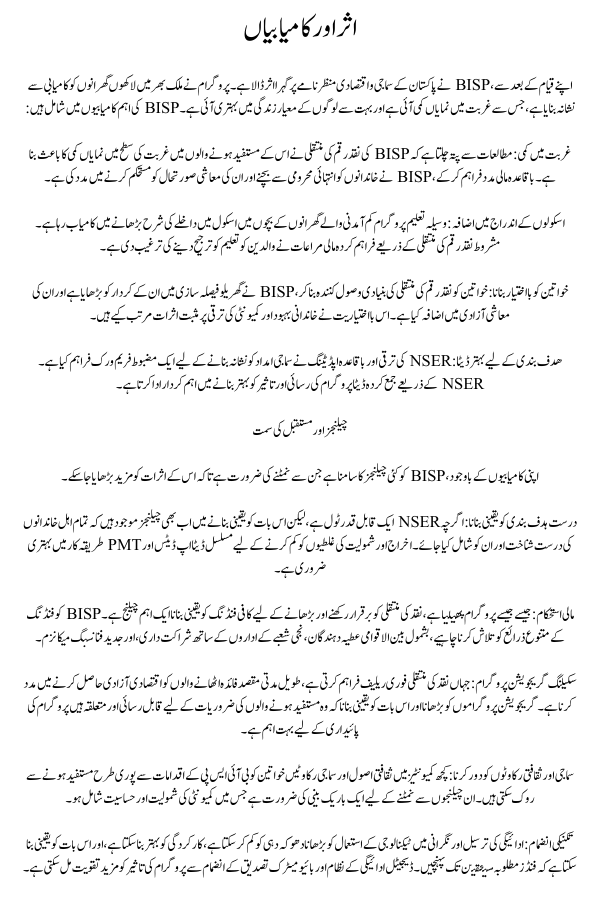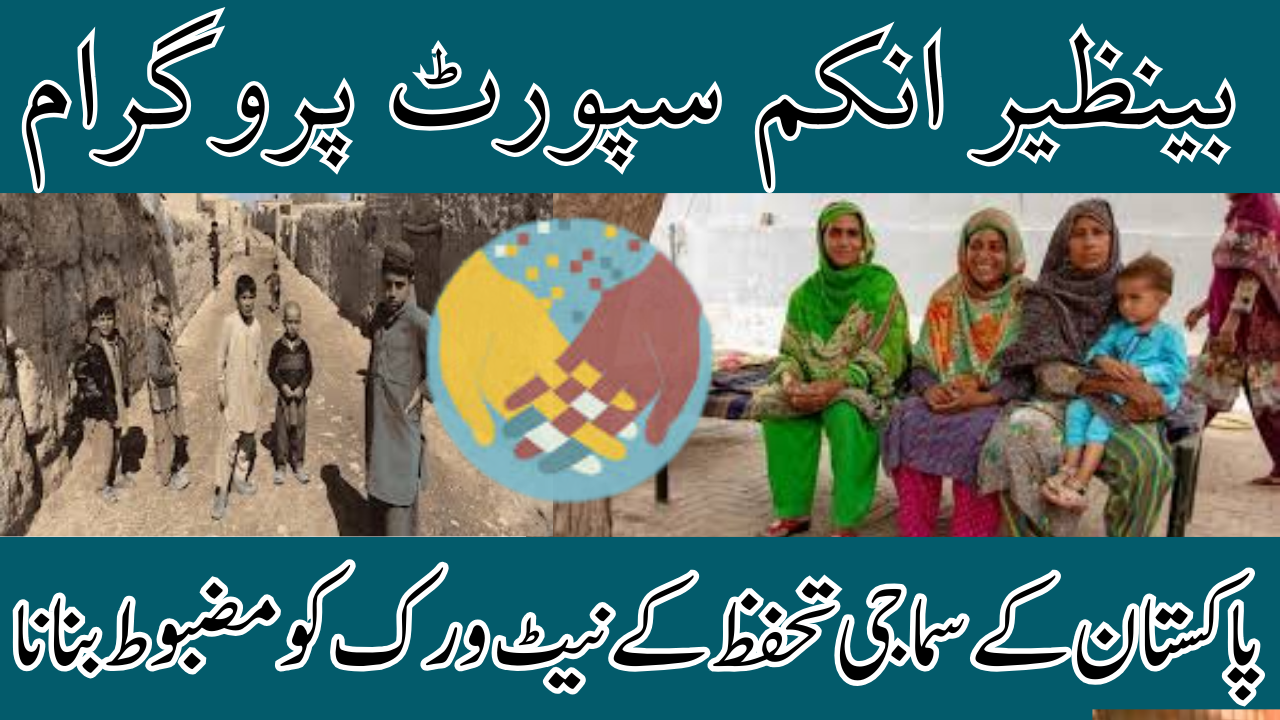Pakistan Social Safety Nets
The Benazir Income Support Programme (BISP) is a pivotal social safety net initiative in Pakistan designed to provide financial assistance to the country’s most vulnerable populations. Launched in 2008 by the Government of Pakistan, BISP aims to alleviate poverty and empower economically disadvantaged families, especially women, through various forms of financial support. Over the years, the program has evolved and expanded its reach, becoming a cornerstone of social protection in Pakistan.
Background and Objectives
BISP was initially established in response to the global financial crisis of 2008 and the subsequent economic challenges that disproportionately affected the poor. The program’s primary objective is to provide direct financial assistance to low-income families, thereby enhancing their purchasing power and enabling them to meet basic needs. BISP focuses on four main goals:
- Poverty Reduction: By providing unconditional cash transfers, BISP helps alleviate immediate poverty and reduces the vulnerability of low-income families.
- Women’s Empowerment: The program specifically targets women, making them the primary recipients of financial assistance. This approach not only ensures that funds are used for household welfare but also empowers women by enhancing their economic standing within their families and communities.
- Health and Education: Through conditional cash transfers, BISP encourages beneficiary families to send their children to school and maintain basic health standards, thereby investing in the next generation’s human capital.
- Economic Stability: By injecting cash into the local economy, BISP stimulates economic activity at the grassroots level, contributing to broader economic stability.
Key Components of BISP
- Unconditional Cash Transfers (UCTs): This is the core component of BISP, where eligible families receive a fixed amount of cash quarterly. The amount has been periodically adjusted to account for inflation and other economic factors. As of recent updates, the cash transfer amount has been set at PKR 10,500 per quarter for eligible families.
- Conditional Cash Transfers (CCTs): These transfers are aimed at promoting education and health. For instance, the Waseela-e-Taleem initiative under BISP provides financial incentives to families for sending their children to school, ensuring attendance and reducing dropout rates. Similarly, health-related CCTs encourage preventive healthcare practices among beneficiaries.
- Dynamic Registry: BISP has developed a National Socio-Economic Registry (NSER), which is a database of eligible beneficiaries. The NSER is regularly updated through household surveys and uses a proxy means test (PMT) to determine eligibility based on socio-economic indicators.
- Graduation Programs: These are aimed at helping beneficiaries transition out of poverty through skills development, vocational training, and microfinance opportunities. By providing tools and resources for economic self-reliance, BISP aims to reduce long-term dependency on social assistance.

Impact and Achievements
Since its inception, BISP has had a profound impact on Pakistan’s socio-economic landscape. The program has successfully targeted millions of households across the country, significantly reducing poverty and improving living standards for many. Key achievements of BISP include:
- Reduction in Poverty: Studies have shown that BISP’s cash transfers have contributed to a notable decrease in poverty levels among its beneficiaries. By providing regular financial support, BISP has helped families avoid extreme deprivation and stabilize their economic situation.
- Increased School Enrollment: The Waseela-e-Taleem program has been successful in increasing school enrollment rates among children from low-income families. The financial incentives provided through conditional cash transfers have encouraged parents to prioritize education.
- Women’s Empowerment: By making women the primary recipients of cash transfers, BISP has enhanced their role in household decision-making and increased their economic independence. This empowerment has had positive ripple effects on family welfare and community development.
- Enhanced Data for Targeting: The development and regular updating of the NSER have provided a robust framework for targeting social assistance. The data collected through NSER has been instrumental in refining the program’s reach and effectiveness.
Challenges and Future Directions
Despite its successes, BISP faces several challenges that need to be addressed to enhance its impact further:
- Ensuring Accurate Targeting: While the NSER is a valuable tool, there are still challenges in ensuring that all eligible families are accurately identified and included. Continuous data updates and improvements in the PMT methodology are essential to minimize errors of exclusion and inclusion.
- Financial Sustainability: As the program expands, ensuring sufficient funding to maintain and increase cash transfers is a critical challenge. BISP must explore diverse funding sources, including international donors, partnerships with private sector entities, and innovative financing mechanisms.
- Scaling Graduation Programs: While cash transfers provide immediate relief, the long-term goal is to help beneficiaries achieve economic independence. Scaling up graduation programs and ensuring they are accessible and relevant to beneficiaries’ needs is crucial for the program’s sustainability.
- Addressing Social and Cultural Barriers: In some communities, cultural norms and social barriers may prevent women from fully benefiting from BISP’s initiatives. Addressing these challenges requires a nuanced approach that involves community engagement and sensitization.
- Technological Integration: Enhancing the use of technology in payment delivery and monitoring can reduce fraud, improve efficiency, and ensure that funds reach the intended beneficiaries. The integration of digital payment systems and biometric verification can further strengthen the program’s effectiveness.

Frequently Asked Questions (FAQs)
1. Who is eligible for BISP?
BISP targets low-income families across Pakistan, with a specific focus on women. Eligibility is determined through a proxy means test (PMT) conducted during the National Socio-Economic Registry (NSER) survey. Families scoring below a certain threshold on the PMT are considered eligible for the program.
2. How can I register for BISP?
To register for BISP, you must participate in the NSER survey, which is periodically conducted by BISP teams across the country. Alternatively, you can visit a BISP Tehsil office or use the 8171 SMS service to check your eligibility status.
3. How much financial assistance does BISP provide?
As of the latest updates, BISP provides PKR 10,500 per quarter to eligible families under the Unconditional Cash Transfer (UCT) program. Additional financial support may be available under various Conditional Cash Transfer (CCT) initiatives.
4. How are BISP payments delivered?
BISP payments are delivered through a variety of methods, including bank transfers, mobile wallets (like JazzCash and EasyPaisa), and ATMs. Beneficiaries can choose their preferred payment method based on convenience and accessibility.
5. Can I appeal if I am declared ineligible for BISP?
Yes, if you believe you were wrongly declared ineligible, you can file an appeal at your nearest BISP Tehsil office or through the BISP helpline. The appeal process involves a review of your socio-economic status and a potential re-evaluation of your eligibility.
6. What is the Waseela-e-Taleem program?
Waseela-e-Taleem is a Conditional Cash Transfer (CCT) initiative under BISP that provides financial incentives to families for sending their children to school. The program aims to increase school enrollment and reduce dropout rates among children from low-income families.
7. How can I check my payment status?
You can check your payment status by sending your CNIC number to the 8171 SMS service or by visiting the official BISP website and using the online portal to check your details.
8. Is BISP only for women?
While BISP primarily targets women to receive financial assistance, the benefits extend to the entire household. The focus on women is designed to empower them economically and ensure that funds are used for family welfare.
9. What are the future plans for BISP?
BISP aims to expand its coverage and enhance its impact through improved targeting, increased financial support, and the integration of technology in payment systems. Additionally, BISP is exploring partnerships with international organizations and private sector entities to ensure financial sustainability and scalability.
10. How does BISP contribute to economic stability?
BISP contributes to economic stability by injecting cash into local economies, which stimulates demand for goods and services. This, in turn, helps create jobs and supports small businesses, contributing to overall economic growth.
Conclusion
The Benazir Income Support Programme has played a crucial role in strengthening Pakistan’s social safety nets and providing a lifeline to millions of low-income families. By continuously evolving and addressing the challenges it faces, BISP remains a vital instrument in the fight against poverty and social inequality in Pakistan.
